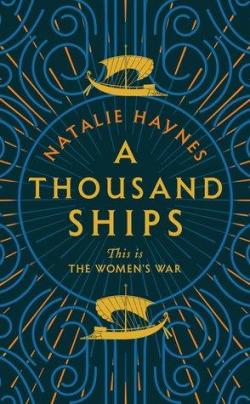
Citations sur A Thousand Ships (9)
When a war ended, the men lost their lives. But the women lost everything else.
Gli rispondo di sì, che tu sei più astuto del guardiano dei porci. « Più astuto di te, mamma ? » dice. « No, amore » gli rispondo. « Più astuto di me, no. »
Non avevano ascoltato, non avevano saputo capire, mentre lei non vedeva altro che il futuro, in continuazione, per sempre. Be’, non per sempre. Vedeva il proprio futuro chiaramente, così come vedeva tutto il resto. Che fosse breve era la sua unica consolazione.
Quando finisce una guerra, gli uomini perdono la vita. Le donne perdono tutto il resto.
I have picked up the old stories and I have shaken them until the hidden women appear in plain sight. I have celebrated them in song because they have waited long enough. Just as I promised him : this was never the story of one woman, or two. It was the story of all of them. A war does not ignore half the people whose lives it touches. So why do we ?
He is learning that in any war, the victors may be destroyed as completely as the vanquished. They still have their lives, but they have given up everything else in order to keep them. They sacrifice what they do not realize they have until they have lost it. And so the man who can win the war can only rarely survive the peace.
The bards all sing of the bravery of heroes and the greatness of your deeds : it is one of the few elements of your story on which they all agree. But no one sings of the courage required by those of us who were left behind.
There are so many ways of telling a war : the entire conflict can be encapsulated in just one incident. One man's anger at the behaviour of another, say. A while war - all ten years of it - might be distilled into that. But this is the women's war, just as much as it is the men's, and the poet will look upon their pain - the pain of the women who have always been relegated to the edges of the story, victims of men - and he will tell it, or he will tell nothing at all. They have waited long enough for their turn.
It's not their deaths he's upset about. It's that he knows what's coming and he's worrying it will be more tragedy than epic. I watch his chest rising and falling as he grabs a fitful rest. Men's deaths are epic, women's deaths are tragic : is that it ? He has misunderstood the very nature of conflict. Epic is countless tragedies, woven together. Heroes don't become heroes without carnage, and carnage has both causes and consequences. And those don't begin and end on a battlefield.
Les Dernières Actualités
Voir plus

Mythes et Légendes
Juliep22
30 livres

Mythologie grecque
Emilouis
39 livres

Femmes du monde
Camille_LaChenille
61 livres
Autres livres de Natalie Haynes (6)
Voir plus
Quiz
Voir plus
Monstres de la mythologie grecque
Je suis une créature hybride, mi-homme mi-cheval.
Le Minotaure
Le Centaure
La Cavale
La Manticore
12 questions
3431 lecteurs ont répondu
Thèmes :
monstre
, mythologie grecque
, créatures mythologiques
, mythologie
, mythesCréer un quiz sur ce livre3431 lecteurs ont répondu

























